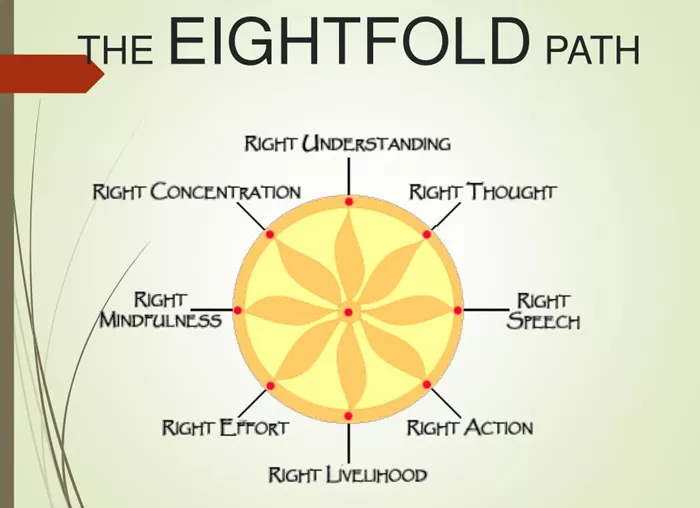The Eightfold Path, also known as the Noble Eightfold Path, is a fundamental teaching in Buddhism that guides individuals toward enlightenment and liberation from suffering. It is part of the Four Noble Truths, which are the core teachings of Buddhism. In this article, we will explore why following the Eightfold Path is essential for spiritual growth and personal development.
Introduction to the Eightfold Path
The Eightfold Path is a comprehensive guide that outlines eight interconnected practices designed to help individuals cultivate wisdom, ethical conduct, and mental discipline. These practices are not meant to be followed in a linear sequence but are interdependent, supporting each other to create a holistic approach to spiritual development. The path is often symbolized by the dharma wheel, which represents its cyclical and interconnected nature.
The Eight Elements of the Path
Right View (or Right Understanding): This involves developing a deep understanding of the nature of reality, including the Four Noble Truths and the concept of karma. It serves as the foundation for the entire path, guiding practitioners to perceive the world with clarity and wisdom.
Right Intention (or Right Resolve): This step involves cultivating intentions that are free from attachment, hatred, and harmful intent. It encourages practitioners to adopt a mindset of compassion, loving-kindness, and renunciation.
Right Speech: Practitioners are encouraged to refrain from verbal misdeeds such as lying, divisive speech, harsh speech, and senseless speech. This promotes harmony and respect in all interactions.
Right Action (or Right Conduct): This involves refraining from physical misdeeds like killing, stealing, and sexual misconduct. It emphasizes living a life of integrity and respect for all beings.
Right Livelihood: Practitioners are advised to avoid occupations that harm others, such as selling weapons, intoxicants, or animals for slaughter. This promotes a lifestyle that supports the well-being of all.
Right Effort: This practice involves abandoning negative states of mind, preventing new ones from arising, and sustaining positive states. It helps in cultivating a balanced and peaceful mind.
Right Mindfulness: This involves being fully aware of the body, feelings, thoughts, and phenomena. Mindfulness helps in developing clarity and insight into the nature of reality.
Right Concentration (or Right Samadhi): This practice involves cultivating single-mindedness and meditative absorption. It reinforces the other practices, leading to equanimity and profound insight.
Why Follow the Eightfold Path?
Following the Eightfold Path offers numerous benefits for personal growth, spiritual development, and liberation from suffering. Here are some reasons why this path is essential for Buddhist believers:
1. Liberation from Suffering
The primary goal of the Eightfold Path is to lead individuals away from suffering and toward enlighten ment. By understanding and addressing the root causes of suffering, practitioners can break free from the cycle of birth and death (samsara) and achieve nirvana.
2. Cultivation of Wisdom
The path emphasizes the development of wisdom, which is crucial for understanding the true nature of reality. Wisdom helps practitioners discern between what is beneficial and what is harmful, guiding them toward actions that lead to liberation.
3. Ethical Conduct
The Eightfold Path promotes ethical living through practices like Right Speech, Right Action, and Right Livelihood. These practices foster a sense of responsibility and respect for all beings, contributing to a more harmonious society.
4. Mental Discipline
Practices such as Right Effort, Right Mindfulness, and Right Concentration help in developing mental discipline. This discipline enables practitioners to manage their thoughts and emotions effectively, leading to a more peaceful and stable mind.
5. Personal Growth and Transformation
Following the Eightfold Path is a transformative journey that leads to personal growth and self-awareness. It helps individuals overcome negative tendencies and cultivate positive qualities like compassion, kindness, and wisdom.
6. Inner Peace and Happiness
By cultivating wisdom, ethical conduct, and mental discipline, practitioners experience a deeper sense of inner peace and happiness. This happiness is not dependent on external circumstances but arises from a profound understanding of reality.
7. Community and Harmony
The Eightfold Path encourages behaviors that promote harmony within communities. By living ethically and mindfully, practitioners contribute to creating a more peaceful and supportive environment for all.
How to Practice the Eightfold Path
Practicing the Eightfold Path involves integrating its principles into daily life. Here are some practical ways to follow this path:
1. Start with Right Understanding
Begin by studying the Four Noble Truths and understanding the nature of reality. This foundation will guide your practice and help you see the world with clarity.
2. Cultivate Mindfulness
Practice mindfulness meditation to develop awareness of your thoughts, feelings, and actions. This will help you stay present and make more mindful decisions.
3. Engage in Ethical Conduct
Adopt practices like Right Speech and Right Action by being truthful, respectful, and compassionate in all interactions.
4. Reflect on Your Intentions
Regularly examine your intentions to ensure they align with the principles of loving-kindness and renunciation.
5. Seek Guidance
Join a Buddhist community or seek guidance from experienced practitioners to deepen your understanding and practice of the Eightfold Path.
Conclusion
The Eightfold Path is a profound guide for spiritual growth and personal transformation. By following its principles, individuals can cultivate wisdom, ethical conduct, and mental discipline, leading to liberation from suffering and a deeper understanding of themselves and the world. This path offers a holistic approach to life, emphasizing the interconnectedness of wisdom, ethics, and meditation. Whether you are a Buddhist believer or simply interested in personal development, the Eightfold Path provides a valuable framework for achieving inner peace, happiness, and enlightenment.
In conclusion, the Eightfold Path is not just a set of practices but a way of life. It invites us to embrace change, cultivate wisdom, and find freedom amidst the impermanence of all things. As Zen Master Suzuki Roshi once said, “When you realize the fact that everything changes and find your composure in it, there you find yourself in nirvana”. By walking this path, we can discover a sense of peace and freedom that is always available, right where we are.

